same-sex marriage
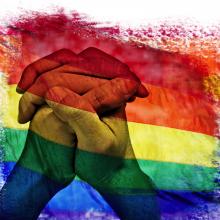
Image via nito/Shutterstock
The year is 2005. We are sitting down to dinner with our friend, Michael, in his apartment. Michael is gay and he’s wrestling with what that means. He is also searching for a church and he is drawn to oursbecause his theology and his understanding of God appear to align well with it. At some point in the meal he stops the conversation and asks bluntly,
"Do you think I would be welcome at your church? Is there is a place for someone like me?"
Jason and I exchange a look and the table falls silent. Finally I look up at Michael and say quietly,
“No. No, I don’t think there is. I’m so sorry.”
Fast forward several years. We’re in a new city and a new church. Jason gets an email from someone interested in checking out said church the following Sunday. She explains that she is gay and believes God made her that way. She’s not interested in debating the point. She’s just interested in finding a church. She thinks ours might be a good fit and asks the exact same question that Michael asked:
"Do you think I would be welcome at your church? Is there is a place for someone like me?"
Jason agonized over that email for days and it pained him immensely to write her back and say no. No, I don’t think there is. I’m so sorry.
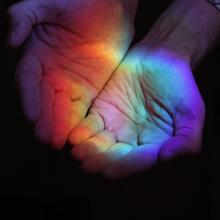
Image via Kichigin/Shutterstock
“I believe Jesus would. I don’t have any verse in scripture. … I believe Jesus would approve gay marriage, but that’s just my own personal belief. I think Jesus would encourage any love affair if it was honest and sincere and was not damaging to anyone else, and I don’t see that gay marriage damages anyone else…” —Jimmy Carter, from his interview with Huffington Post Live
I grew up in Texas as a churchgoing Baptist. I memorized Bible verses as part of my “sword drills,” went to church camp, took part in the clown ministry and even helped in the nursery.
Then I was kicked out at age seventeen for asking too many questions. My youth minister actually threw a Bible at my head and, in a less than nuanced way, invited me to move on, lest I contaminate the minds and hearts of my friends with my doubt.
Some of my questions had to do with their biblical interpretation, which was literal — and their assertion that the texts we were memorizing were the perfect, infallible Word of God, straight from the mind of the Divine to the paper on which it was written.
I had questions.
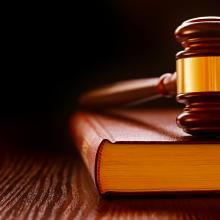
Photo via sergign / Shutterstock.com
Despite threats from some conservative Christian dissenters, civil disobedience may turn out to be an irrelevant response to gay marriage.
To understand why, we have to think seriously about what civil disobedience really is.
Here’s a good definition: If a government mandates what religious people believe God forbids, or forbids what religious people believe God mandates, civil disobedience may be required.
In the first case civil disobedience involves the refusal to do what government commands, and in the second case it involves the continued practice of an act that government has banned.
Could this apply to the new legalization of gay marriage nationwide?
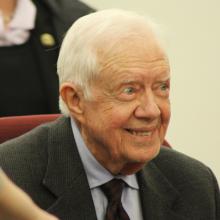
Former President Jimmy Carter. Photo via Adelle M. Banks / RNS
Former President Jimmy Carter said in an interview that he thinks Jesus would approve of gay marriage.
“I think Jesus would encourage any love affair if it was honest and sincere and was not damaging to anyone else, and I don’t see that gay marriage damages anyone else,” Carter said in a HuffPost Live interview with Marc Lamont Hill published July 7.
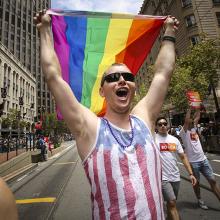
A man waves a rainbow flag on Sunday (June 28, 2015) while marching in the San Francisco gay pride parade two days after the Supreme Court’s landmark decision that legalized same-sex marriage throughout the country. Photo via REUTERS / Elijah Nouvelage / RNS
In the wake of the landmark Supreme Court decision legalizing gay marriage, a favorite talking point among social conservatives was that even if they lost a battle, they could still win the war: The ruling in Obergefell v. Hodges was akin to the 1973 Roe v. Wade verdict legalizing abortion, they argued , and opponents would continue to fight, and steadily work their way back to victory .
There are several obstacles to that scenario, however. Here are some of them.
When I think about that trip to Charleston with its confederate flag, slave auction block, statues to slave holders, and museums honoring the daughters of the confederacy, it makes it a whole lot harder to fully believe in the hashtag #lovewins. And when I see the subtle and not-so-subtle ways that racism has infused a largely white-led movement for LGBTQ justice — an infusion I have been complicit in even as I have attempted to critique it — my conscience convicts me. I know that in this one moment, love has won a precious victory that allows me the privilege to be healthy, loved, and fully seen. I also know that at this moment systemic racism has murdered nine beautiful people and brutalized countless others. It is a moment in time that asks us to both celebrate and mourn, and more than anything else reminds us of the work yet to be done.
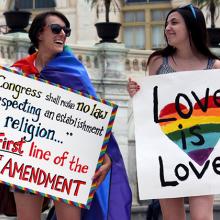
Mandy Roach, left, and Amy Joslin stood behind the March for Marriage speakers and raised signs supporting marriage equality on June 19, 2014 in Washington, D.C. Photo via Heather Adams / RNS
I would like to believe that Charlotte and Trudy are in the world to come, applauding and dancing.
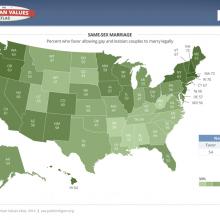
Image via PRRI / RNS
The Supreme Court ruling June 26 to legalize gay marriage rested in pragmatic legal reasoning, the same approach in the June 25 ruling on the Affordable Care Act — the decision that saved Obamacare from a “death spiral.”
Justice Anthony Kennedy, author of the majority opinion in the 5-4 decision, described equal protection under the law as an inevitable step in the evolution of changing understandings of marriage across the centuries and essential for the safety and dignity of thousands of gay and lesbian couples and their children.
The Supreme Court ruling June 26 to legalize gay marriage rested in pragmatic legal reasoning, the same approach in the June 25 ruling on the Affordable Care Act — the decision that saved Obamacare from a “ death spiral.”
Justice Anthony Kennedy, author of the majority opinion in the 5-4 decision, described equal protection under the law as an inevitable step in the evolution of changing understandings of marriage across the centuries and essential for the safety and dignity of thousands of gay and lesbian couples and their children.
In the days before the Supreme Court made it possible for gay couples to marry everywhere in the U.S., we asked two couples of faith — one Jewish who live in a state that forbids gay marriage, and one Christian and opposed to gay marriage — what the decision would mean to them.
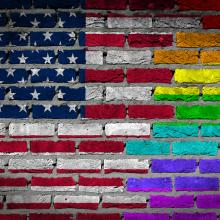
MyImages - Micha/ Shutterstock
The Constitution was born within a worldview hospitable to transformation and open to corrections of injustices in letter and spirit. Examples abound: women’s right to vote, interracial marriage, the right to open legislative deliberations with prayer, and the right to education without segregation.
The Constitution has never claimed to be, in itself, the last word. Rather, it has claimed to be the first.
While I will not propose that every decision the Supreme Court has made has been for the betterment of all people, today’s ruling on same-sex marriage is an example of a nation reforming itself for the better.
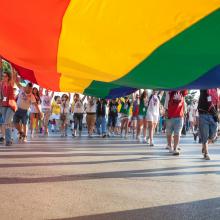
blackboard1965/Shutterstock
The debate is over.
In a landmark decision, the Supreme Court decided this morning that marriage was a fundamental right for all couples regardless of gender. All Americans who wish to can now marry the same-sex partner they love. Every state law that bans such marriages is now dead. And it is over. It is finished. This debate, at long last, is done.
This is a good day to be present. I want to document this day into my memory, so I might tell my children about it later. Although at 25 I can’t possibly understand all this decision entails, there may be a day down the road when I stand tuxedoed and teary-eyed and holding the hands of another, and I want this memory to color that moment. I want to feel the gift of it.
But this day also brings up a lot of complicated feelings for me, too. I am, after all, a follower of Jesus, and many in this family of Christians are not celebrating with me. They are unsure of what to say, uncertain of what the future holds.
I walked down Burnside and the first parade on-lookers squinted and began to read my placard. I did not know what to expect at first: Did they think I was protesting Pride? Would they accept my apology?
I was overwhelmed by the response. People began to cheer. Many asked me to slow down so they could take a picture. Some wiped away tears and simply mouthed “thank you,” or “I accept [your apology].” For the next few miles cheers and cameras and tears greeted us everywhere we went. I was grateful I was wearing sunglasses, because there were a few moments where I simply welled up with tears and couldn’t handle it any more.
This week, North Carolina’s legislature overrode its Republican governor’s veto to allow magistrates and clerks to refuse to perform same-sex marriages.
This unprecedented move — never before have state employees been allowed to simply stop doing their jobs — comes at a time of profound debate regarding same-sex marriage. It is exactly the wrong move.
When I reached high school and started dating, my relatives had a lot of questions: "This girl you’re going to the movies with: Is she Catholic? Slovak? What’s her family’s last name? What does her father do for a living?"
She had to be Catholic, of course. Preferably Slovak. If not, some other nearby nationality. Anything less would get disapproving comments. Those questions may sound odd now, but they mattered back then. The Catholic Church had only recently concluded Vatican II, which tried to bridge centuries of animosity between churches. Accepting Protestants as equals was something new. And many of the immigrants in my neighborhood were trying to preserve the culture and traditions that they brought from Europe. They were afraid of losing their heritage in the new land.
For them, traditional marriage meant choosing someone from the same faith, the same ethnic background. Simply put, they were afraid. Terrified, actually. They feared that if marriage changed, their world would fall apart.
That's why to so many people, my relationship wasn’t about finding someone who fit me — it was more about me finding someone who fit them.
By the end of June — and as early as next week — the Supreme Court is expected to rule on the legality of gay marriage nationwide. In a pre-emptive move to refocus narrative and legislative control at the state level, two states this week enacted laws designed to protect religious objection to same-sex couples. Here's how.
Most Americans — including people from every major religious group — predict gay marriage will be legalized nationwide when a hotly anticipated Supreme Court ruling is announced later this month.
Among those who favor legalizing same-sex marriage, 80 percent think the high court will rule their way, according to a survey by the Public Religion Research Institute released June 11. And among those who oppose gay marriage, 47 percent say that’s the likely outcome, too.
After decades of “bridge building” between the LGBTQ community and those who identify as evangelicals in opposition to full LGBTQ inclusion, Tony Campolo spoke out in favor of both full inclusion of same-sex couples in the church, as well as for marriage equality.
“It has taken countless hours of prayer, study, conversation and emotional turmoil to bring me to the place where I am finally ready to call for the full acceptance of Christian gay couples into the Church,” he wrote on his blog on June 8.
Amid the national buzz over transgender celebrity Caitlyn (formerly Bruce) Jenner revealing her new female identity, a leading culture warrior in the Catholic hierarchy on June 3 denounced the spread of “gender ideology” and warned that it threatens the very foundation of the church’s faith.
“The clear biological fact is that a human being is born either male or female,” Archbishop Salvatore Cordileone of San Francisco said at the start of an address in Manhattan at a conference aimed at promoting an older form of the Mass in Latin.
When Ireland became the first country to legalize same-gender marriage by popular mandate, double rainbows appeared over Dublin, and an Irish rock band transformed their Arizona concert into a gay-rights celebration. Almost 30 years ago, Bono endured threats from angry Arizonans for his support of the U.S. national holiday for the late Rev. Martin Luther King Jr. But on Saturday, Bono invoked King as peacemaker as U2 celebrated the victory of love, turning the song “Pride (In The Name of Love)” into an anthem for gay pride.
...
Bono shared, “This is a moment to thank the people who bring us peace. It’s a moment for us to thank the people who brought peace to our country. We have peace in Ireland today! And in fact on this very day we have true equality in Ireland. Because millions turned up to vote yesterday to say, ‘love is the highest law in the land! Love! The biggest turnout in the history of the state, to say, ‘love is the highest law in the land!’ Because if God loves us, whoever we love, wherever we come from … then why can’t the state?’”










